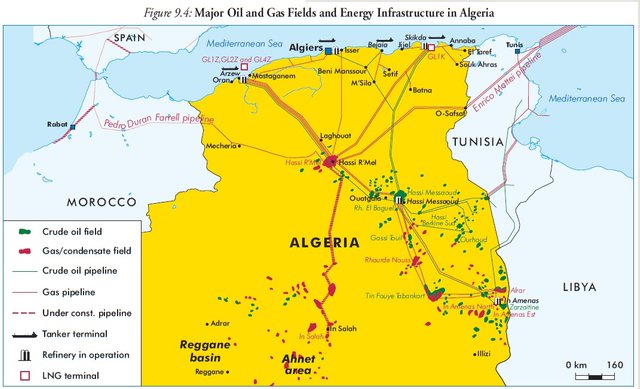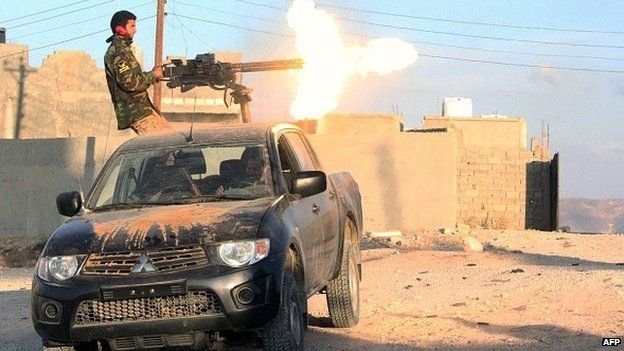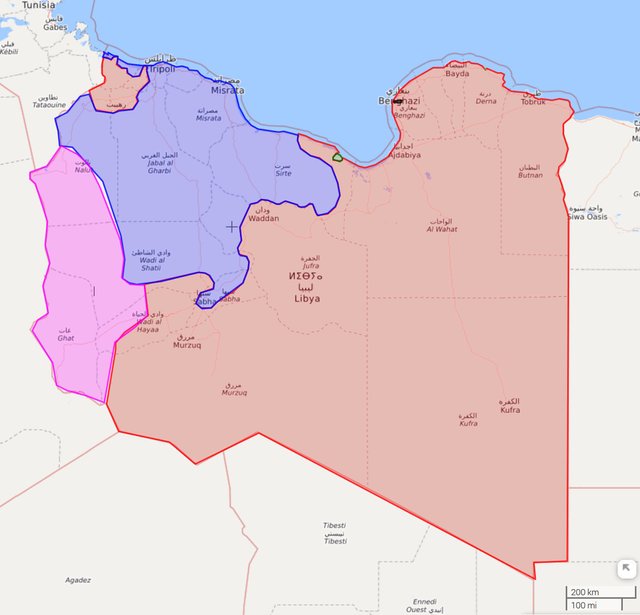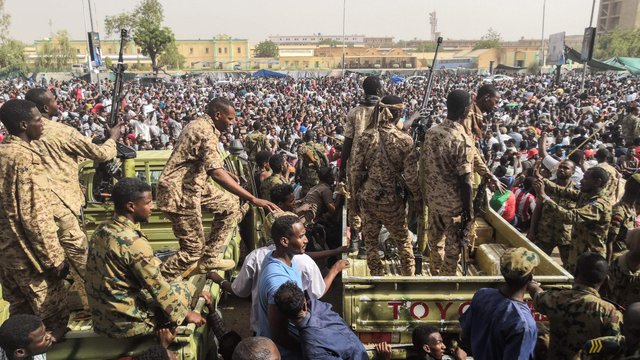Petroleum Spring? Libya, Algeria & Sudan
The last month has brought with it the end of two long time regimes in Africa. Both countries are rich with oil resources. Along with Libya, the events unfolding right now present three unique stories that could all head in similar directions.
I spoke about Algeria previously. To summarize, the long time ruler Abdelaziz Bouteflika stepped down after weeks of protests and pressure from the army & bureaucracy. I first wondered if this was partly orchestrated by Western (or Eastern) interests, but Eric Margolis, a source I trust wholly states that this is an authentic rise against the ruler.
That's great to hear, but how it unfolds is what matters. We already see that the army is not leaving the streets, so neither are the people. The army usually plays "transition" government while elections can be set up, what happens after the election depends on the results. An army that has taken power can find it hard to hand over that power, or become subjects to it, since the army has an army.

Military juntas are good for business too. If you take the history of many previous European colonies post-colonial governments, you'll most often find some "General" or "Colonel" strongman that took power during a coup or at the end of a civil war. Sound familiar?
As we saw in Egypt, the fate of Algeria and the other countries on this list can change quickly. Foreign interests can not be ignored, as the ability to exploit the tension in the country at the time of revolution is not difficult. There's many groups grasping for power and a voice.
The voices for democracy in Algeria include an Islamic side and a true civil rights, Enlightenment side. There is a radical Islamic thread that runs through areas of the nation, and this is where the concern can arise.

Let's go to Libya.
It's been 8 years since Hillary cackled and Gaddafi died.
US troops have been on the ground in some form or another the entire time. Well, until last week anyway.
While Libya has moved out of the news in the US, what's been going on in country has been a wild story and a lesson to learn. Since the initial weeks after the death of the Colonel, the countries center of power has been in flux. The Islamic militia groups that the United States had armed did not want to give up the power they had gained. While the militia groups may have received weapons, it was Islamic and civilian politicians that received international recognition & Western support in Tripoli. This was the group that rose to have the title of "recognized government" to the world.
The General Nation Congress (GNC) had a mandate until 2014 to bring about control and open election. They did have one major problem. No troops. The Islamic militias supported by the West became their fighting force, helping to secure control of Tripoli and the west of the country.
At the same time that the GNC was putting Tripoli back together, a former leader in Gaddafi's army who had spend the last few decades in Virginia has a guest of the CIA made his way back to Libya. "Field Marshall" Khalifa Haftar and his organized and experienced army set up shop in the eastern city of Tobruk. He would take control of Benghazi and call for the dissolving of the GNC, especially after it extended its own mandate in 2014 (politicians gonna politic).

Khalifa Haftar originally joined up with Gaddafi when he was 26. He was active in the Colonel's army when he took power, and was his Chief of Staff after the Sinai War of 1973. He was later captured in Chad, already falling out of favor with Gaddafi. He was denounced when news of his capture became known, and Haftar declared he would overthrow the Colonel. With his life in danger, he took a deal with the US for his release from Chad. He was moved (and became a citizen) to Virginia in 1990, but not before he created his own militia in the Democratic Republic of Congo. He's been waiting in the wings for the post-Gaddafi era to begin.
Haftar attacked Benghazi & Tripoli in August of 2014 (sponsored by Sisi in Egypt and the UAE), at the same time elections were being held. While the offensive wasn't successful, the election was. The House of Representatives won power (who Haftar supported), but were soon forced out of Tripoli, having to hide out on a Greek ferry in the city harbor. The House of Reps. eventually made to back to Tobruk and declared themselves the internationally recognized government of Libya.
Khalifa Haftar began to gain foreign investors. The Egyptian military junta liked his style and the opportunity to control the outcome of a civil war in a neighboring country. The Saudis also supported Haftar, as the UN-EU backed government in Tripoli did them no favors. The UAE also followed suit, but it is the European power-player France that makes this story interesting.
President Macron has invited Haftar to France more than once in the past, the idea being that he can bring security, oil to France and halt the flow of migrants into European, with an iron fist if necessary.

In 2016, the UN attempted to create a Unity Government in Tripoli, made up of the same arm-chair politicians that could be relied on fall in line. Like the General Assembly however, they still have no forces of their own. So when Fayez Seraj was selected as the leader of the new government, nothing really changed on the ground.
Haftar's government in the east has continued to expand it's territory. He took control of the oil fields in the south of the country, an area that was lawless after the fall of the previous regime. This current invasion of Tripoli is his third since 2014, and the whole of the country, save the far West is under his control.

All of this has lead the United States to remove their troops from the country. The US has reached out to Haftar about having a high position in the Unity Government in an attempt to keep some control of events on the ground. Most European powers have called for Haftar to stop his attack on Tripoli, France however, is not one of them. France is even supported hosting peace talks
Personally, I see the Field Marshall as the next leader of Libya, with a newly polished relationship with the Trump Administration. Trump likes strongman and military types. Obama's preferred outcome of any regime change was a suit and tie government in power, completely beholden & paid for by Western interests. Military strongman make deals, and just ask for a long leash on how they operate their business.
Algeria's future coming into focus?

Sudan is the last country on our list.
Sudan as a nation is a shell of it's former self. The southern, oil rich area of the country was carved off by the Americans and declared South Sudan. The newly created country has been fighting a civil war of it's own ever since it's birth. That oil money huh?
Sudan has been ruled by Oman Hassan al-Bashir for the last thirty years. He is wanted by the International Criminal Court for arming the genocide in the Western region of this country, Darfur. He has hosted Osama Bin Laden and welcomed US sanctions on his people. His time had come after months of protests. The army stepped in and removed him this week.
The videos of the street protests are everywhere. I only remember the one video on Twitter I saw of the army showing up to a street celebration, firing their weapons in the air. The figurehead of a tyrant had been removed, but the body remained. The army has announced they will be in control for a two year "transition period". The head of the army and new leader is also wanted by the ICC for Darfur war crimes It's only a matter of time before a strongman emerges.

The US has cut all ties with the country for the time being. The peace talks between warring sides in South Sudan seem to be in jeopardy I see this as a "wait and see", much like I'm sure Algeria is and Libya has become.
Algeria and Sudan could erupt into civil war, with the military positioned against a mix of revolutionaries not happy with the current results and Islamic fundamentalist groups armed with weapons from former conflicts or outside forces. The countries could instead stabilize behind the military governments, allowing the foreign interests to breath a sigh of relief.
I wonder with the pending consolidation behind Haftar in Libya, if the West attempts to take this opportunity to stabilize the unrest in Algeria and Sudan behind strongman of their own. This strategy relies on if the forces that find themselves in power want to play ball. If not, we could see repeats of Syria and Libya, where the West take the side of "the people" by arming the most violent among them. The results being a destabilized wasteland, locked in a war of opposing sides backed by different geopolitical actors.
Image sources: 1, 2, 3, 4, 5, 6, 7
Facebook / Twitter / Instagram / WordPress / Patreon / Youtube
Check out the #Informationwar & DecentralizedTruth, our channel over on YouTube and our Reddit
Curated for #informationwar (by @wakeupnd)
Ways you can help the @informationwar!
Congratulations @chieppa1! You have completed the following achievement on the Steem blockchain and have been rewarded with new badge(s) :
You can view your badges on your Steem Board and compare to others on the Steem Ranking
If you no longer want to receive notifications, reply to this comment with the word
STOPVote for @Steemitboard as a witness to get one more award and increased upvotes!